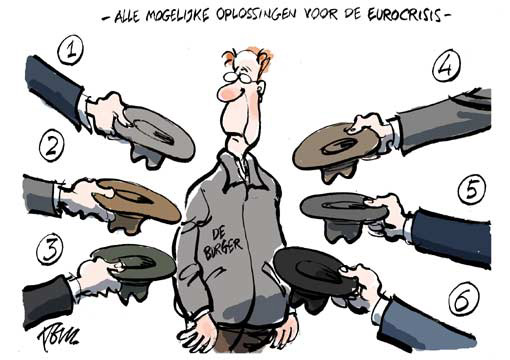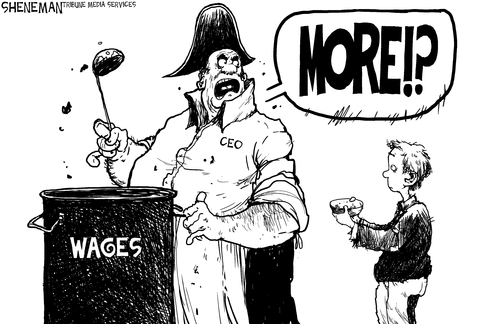
In my previous post, I stated:
In reality, there was nothing in Bohm-Bawerk’s argument to be disproved. Bohm-Bawerk had indeed cited the essential contradiction at the core of capitalism. His problem, however, was to imagine the contradiction to be a defect of Marx’s theory, and not a fatal flaw laying at the heart of the capitalist mode of production itself.”
Bohm-Bawerk had inadvertently confirmed the rather grim future arrived at by Marx’s theory: Capitalism would kill the so-called free market, and in so doing, would destroy itself. It was, as Marx argued, creating its own gravediggers, a mass of directly social laborers who did not need it, and would see it as an impediment to their very survival, owing to obstacles it put in the way of its own operation.
By the 1970s, economists finally were forced to acknowledge there was in fact no inconsistency in Marx’s argument. Marx had, just as Bohm-Bawerk accused him, arrived at a theoretical description for why prices, although resting on the socially necessary labor time required to produce commodities, nevertheless appeared to reflect the prices of production of these commodities and not their labor times. It was not, as Werner Sombart feared, that from Marx’s labor theory of value “emerges a ‘quite ordinary’ theory of cost of production”, but precisely that Marx’s theory predicted from the first that the value of commodities must appear in the form of prices of production.
Moreover, Marx had demonstrated his proof almost in real time, so to speak, in front of his audience in a painstakingly detailed series of volumes — subject to the critical purview of his opponents. He had, as it were, made the elephant in the room — socially necessary labor time — disappear before the disbelieving eyes of his skeptical audience. It was a performance so dramatic and unprecedented, it took decades for the skeptics even to figure out what they had just witnessed with their own eyes.
The acknowledgement of Marx’s triumph took the form of a paper by Paul A. Samuelson, and was couched in the form of the complaint echoing that leveled against Marx by Sombart, as previously quoted by Bohm-Bawerk :
“…if I have in the end to explain the profits by the cost of production, wherefore the whole cumbrous apparatus of the theories of value and surplus value?”
Taking a cue from Sombart, Samuelson, in a paper titled “Understanding the Marxian Notion of Exploitation: A summary of the So-Called Transformation Problem Between Marxian Values and Competitive Prices”, introduced his so-called erasure method arguing,
It is well understood that Karl Marx’s model in Volume I of Capital (in which the “values” of goods are proportional — albeit not equal — to the labor embodied directly and indirectly in the goods) differs systematically from Marx’s model in Volume III of Capital, in which actual competitive “prices” are relatively lowest for those goods of highest direct-labor intensity and highest for those goods of low labor intensity (or, in Marxian terminology, for those with highest “organic composition of capital”). Critics of Marxian economics have tended to regard the Volume III model as a return to conventional economic theory, and a belated, less-than-frank admission that the novel analysis of Volume I — the calculation of “equal rates of surplus value” and of “values” — was all an unnecessary and sterile muddle.’
Samuelson gave a simple straightforward explanation of his “erasure method”:
I should perhaps explain in the beginning why the words “so-called transformation problem” appear in the title. As the present survey shows, better descriptive words than “the transformation problem” would be provided by “the problem of comparing and contrasting the mutually-exclusive alternatives of `values’ and `prices’.” For when you cut through the maze of algebra and come to understand what is going on, you discover that the “transformation algorithm” is precisely of the following form: “Contemplate two alternative and discordant systems. Write down one. Now transform by taking an eraser and rubbing it out. Then fill in the other one. Voila!
For all his genius, Samuelson argued, Marx had produced a theory which offered no greater insight into the social process of production than was already present in the form of mainstream economics. It could, for this reason, be entirely ignored.
Ignored also, however, would be the entire point of Marx’s “unnecessary and sterile” detour: namely, to demonstrate in comprehensive and theoretically ironclad fashion why the capitalism mode of production is doomed.
This only deepens the mystery of David Bieri’s interest in a theory routinely dismissed by economists as, at best, a vestigial remnant of classical political-economy. Why would this former bureaucrat of the Bank for International Settlements still be reviewing an obscure technical problem of a long dead theory?
Read more…



